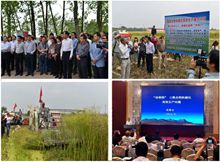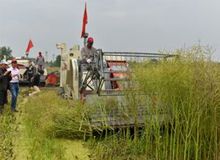分享到
Novel mechanized rapeseed production with enhanced efficiency
 On May 15, the Chinese Academy of Agricultural Sciences (CAAS) hosted a demonstration meeting for mechanized rapeseed production in Gong’An County, Hubei Province. Successful integration of nine key techniques developed by scientists of different disciplines in the demonstration location has resulted with a highly efficient model of mechanized rapeseed production from sowing to harvesting. This novel model could be the solution for increasing rapeseed production and efficiency with decreased manpower demand in the country.
On May 15, the Chinese Academy of Agricultural Sciences (CAAS) hosted a demonstration meeting for mechanized rapeseed production in Gong’An County, Hubei Province. Successful integration of nine key techniques developed by scientists of different disciplines in the demonstration location has resulted with a highly efficient model of mechanized rapeseed production from sowing to harvesting. This novel model could be the solution for increasing rapeseed production and efficiency with decreased manpower demand in the country.In the field, multiple combine harvesters and threshers harvested rapeseed in the demonstration base, while farmers simply stood aside and commanded. It was seen that comparing to the surrounding fields, rapeseed plants in the demonstration base were more upright and more resistant to lodging and diseases. Academician Guan Chunyun of the Chinese Academy of Engineering (CAE) said that the mechanization and efficient production model effectively addressed many factors and labor-intensive problem, and could largely promote rapeseed production in China.
Rapeseed is the largest domestic edible oil source in China. However, with the transfer of rural labor and competition with mechanized wheat production in the same season, rapeseed has become less competitive due to long its growth period, labor-intensive and complex technique demand. Many experts believed that unless mechanized production could be popular, rapeseed cultivation might further decline, which would worsen the highly import-dependent edible oil industry.
 Dr Wang Hanzhong, Principal Scientist of the National Rapeseed Research System and Director General of Oil Crops Research Institute (OCRI) of CAAS, said that nine key techniques including improved varieties, machinery, plant protection, soil and fertilizer, planting model and regulation involved in the whole production process of rapeseed have been effectively integrated in recent years. ‘Zhongshuang 11’ developed by the OCRI is a novel rapeseed cultivar with high level resistance to shattering, lodging and diseases and high oil content (over 49%), and is currently the most desirable cultivar for mechanized production.
Dr Wang Hanzhong, Principal Scientist of the National Rapeseed Research System and Director General of Oil Crops Research Institute (OCRI) of CAAS, said that nine key techniques including improved varieties, machinery, plant protection, soil and fertilizer, planting model and regulation involved in the whole production process of rapeseed have been effectively integrated in recent years. ‘Zhongshuang 11’ developed by the OCRI is a novel rapeseed cultivar with high level resistance to shattering, lodging and diseases and high oil content (over 49%), and is currently the most desirable cultivar for mechanized production.The key techniques applied in the novel model included soil and water management, slow-release of balanced fertilizers, plant density control, joint mechanical sowing, pre-germination weeding, "one promotion and four preventions", mechanical harvesting, and fast straw decomposing. CAE Academician Wu Kongming said that efficient mechanized production has been the result of a series of scientific research and technical innovation and would be meaningful in enhancing productivity, reducing manpower and increasing farmers’ income.
Latest News
-
 Apr 18, 2024Opening Ceremony of the Training Workshop on Wheat Head Scab Resistance Breeding and Pest Control in Africa Held in CAAS
Apr 18, 2024Opening Ceremony of the Training Workshop on Wheat Head Scab Resistance Breeding and Pest Control in Africa Held in CAAS -
 Apr 03, 2024IPPCAAS Co-organized the Training Workshop on Management and Application of Biopesticides in Nepal
Apr 03, 2024IPPCAAS Co-organized the Training Workshop on Management and Application of Biopesticides in Nepal -
 Mar 28, 2024Delegation from the School of Agriculture and Food Science of University College Dublin, Ireland Visit to IAS, CAAS
Mar 28, 2024Delegation from the School of Agriculture and Food Science of University College Dublin, Ireland Visit to IAS, CAAS -
 Mar 25, 2024Director of World Food Prize Foundation visited GSCAAS
Mar 25, 2024Director of World Food Prize Foundation visited GSCAAS -
 Mar 20, 2024Institute of Crop Sciences (ICS) and Syngenta Group Global Seeds Advance Collaborative Research in the Seed Industry
Mar 20, 2024Institute of Crop Sciences (ICS) and Syngenta Group Global Seeds Advance Collaborative Research in the Seed Industry
